Table of Contents
What will happen in the tech world in 2022? As we say, change is the only constant in the technology world. In this article, we have summarised some of the trends that will help you understand the latest technology trends that will accelerate the pace of innovation, disruption, and digitalization in 2022.
Some of those topics are already well-covered by Gartner in their latest Top Strategic Technology Trends. We recommend having a look at it as it shows a great amount of relevant information & statistics.
Top 5 Technology Trends for 2022
Data-based Solutions
Data-based solutions discover what companies really need to help make strategic decisions based on data analysis. A data-driven approach comes with the ability to analyze the performance of a project objectively and make rational and informed decisions, playing an essential part to operational and strategic effectiveness. Gartner argues that data “can reduce data management efforts by up to 70%”. Data-driven solutions have shown benefits such as improvement in product quality and customer satisfaction or contribute to better financial performance, as well as reducing environmental impact and increasing workforce diversity. In here we also include AI engineering as an integrated approach for operationalizing AI models. As the mentioned paper said “By 2025, the 10% of enterprises that establish AI engineering best practices will generate at least three times more value from their AI efforts than the 90% of enterprises that do not.”
Cloud-Native Platforms
Cloud-native is an approach to building and running applications that exploits the advantages of the cloud computing delivery model. Being a powerful trend almost every single year, it has real traction among companies still struggling to repurpose their applications portfolios as well as the use of cloud-native platforms to build applications built upon containers, microservices, serverless functions and immutable infrastructure, deployed via declarative code are common elements of this architectural style. When companies build and operate applications using a cloud native architecture, they bring new ideas to market faster and respond sooner to customer demands.
Privacy-Enhancing Computation
Privacy is trendy. Privacy-enhancing computation protects data in use while maintaining privacy or secrecy online common data-at-rest security measures. According to Gartner, 50% of large organizations will implement privacy-enhancing computation to process data in untrusted environments and multiparty data analytics use cases. While they are more concerns on privacy,
Gartner’s “privacy-enhancing computation” is a new name for an old problem that no one cares enough about to change their online behavior. Privacy-enhancing technologies (PETs) embody fundamental data protection principles by minimizing personal data use, maximizing data security, and empowering individuals. With so many business models living off privacy rules, this one is going to be a relevant trend to follow over the next year.
Composable Applications
Composable applications are made from interchangeable building blocks. Composable applications are about legacy applications preservation, as more and more companies try to migrate away from old architectures all the way to cloud-native status. Composable systems demand that businesses assign developers the difficult and time-consuming chore of creating the code that makes it possible for various instruments to function well together.
According to Gartner, the three building blocks of composable business are:
- Composable thinking: when you combine the principles of modularity, autonomy, orchestration and discovery with composable thinking, it should guide your approach to conceptualizing what to compose, and when.
- Composable business architecture: ensures that your organization is built to be flexible and resilient. These are structural capabilities that are giving you mechanisms to use in architecting your business.
- Composable technologies: are the pieces and parts, and what connects them all together.
New era of Automation
This trend has been in play forever. Hyperautomation, according to Gartner, is “a disciplined, business-driven approach to rapidly identify, vet and automate as many business and IT processes as possible”. Under the umbrella of robotic process automation (RPA) where processes are modeled, mined, eliminated, modified, or automated, the goal has been a trend and an ongoing aspiration for some time.
So called Hyperautomation have some benefits:
- Accelerating Complex Work: provides a high-speed route to engaging everyone in transforming the business, supported by automating more and more complex work that relies on knowledge input from people.
- Deploying Digital Workers: upskilling RPA with intelligence creates an intelligent Digital Workforce that can take on repetitive tasks to augment employee performance. These Digital Workers are the change agents of new era of automation or hyperautomation, and they are able to connect to various business applications, operate with structured and unstructured data, analyze data and make decisions, and discover processes and new automation opportunities.
Conclusions
While things move fast in technology land, major trends – like applications architecture and AI will be trending for years. It’s hard to describe truly new trends, so technology prognosticators rename old ones with catchy names.
Gartner’s survey data suggests that there’s still some skepticism about how quickly executives believe they have to ramp up their AI and machine learning (ML) investments. Deloitte also reports that companies are bullish on AI/ML, that eventually they expect AI/ML to really impact their business. So the real trend is cautious optimism. Analytics is now mainstream but seamless, integrated and accessible data is an ongoing aspiration.
Applications architecture is finally getting some traction. Companies are moving toward microservices-based applications as they remove their legacy applications from life support. Container technology has evolved nicely and, perhaps most importantly, the major cloud vendors offer a variety of solutions here. Edge computing is part of this, and total experience applications will always be what everyone strives to build & probably the future of trends over the next years.
I hope you found this article useful. If you believe that we are missing other trends that deserve to be mentioned here, let us know in the comments section below!
And if you need help with your software or data project, let us know, we are experts in developing software platforms applying data science!
Author
-
Senior Marketing Consultant & Marketing Manager at Apiumhub. He brings over 10 years of industry experience. He specializes in digital marketing, SEO & business intelligence, delivering results through data-driven strategies.
View all posts









